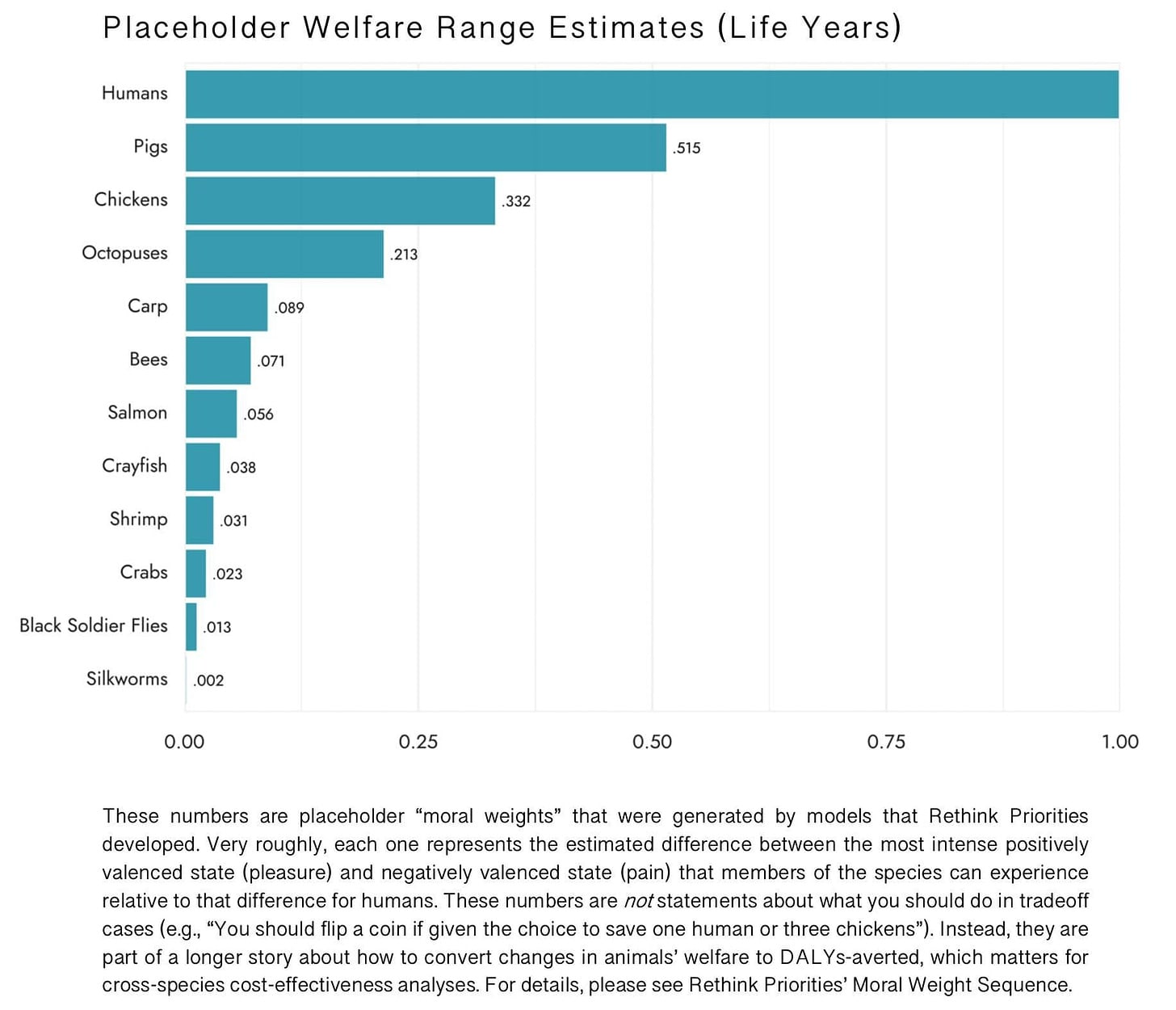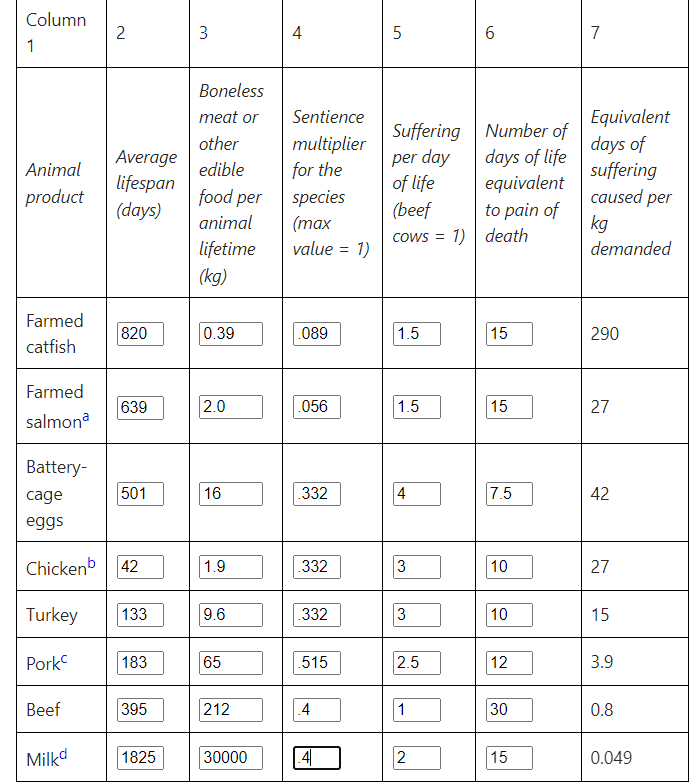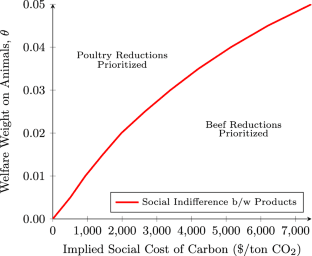Crosspost of my blog.
You shouldn’t eat animals in normal circumstances. That much is, in my view, quite thoroughly obvious. Animals undergo cruel, hellish conditions that we’d confidently describe as torture if they were inflicted on a human (or even a dog). No hamburger is worth that kind of cruelty. However, not all animals are the same. Contra Napoleon in Animal Farm, all animals are not equal.
Cows are big. The average person eats 2400 chickens but only 11 cows in their life. That’s mostly because chickens are so many times smaller than cows, so you can only get so many chicken sandwiches out of a single chicken. But how much worse is chicken than cow?
Brian Tomasik devised a helpful suffering calculator chart. It has various columns—one for how sentient you think the animals are, compared to humans, one for how long the animals lives, etc. You can change the numbers around if you want. I changed the sentience numbers to accord with the results of the most detailed report on the subject (for the animals they didn’t sample, I just compared similar animals), done by Rethink Priorities:
When I did that, I got the following:
Rather than, as the original chart did, setting cows = 1 for the sentience threshold, I set humans = 1 for it. So therefore you should think in terms of the suffering caused as roughly equivalent to the suffering caused if you locked a severely mentally enfeebled person or baby in a factory farm and tormented them for that number of days. Dairy turns out not that bad compared to the rest—a kg of dairy is only equivalent to torturing a baby for about 70 minutes in terms of suffering caused. That means if you get a gallon of milk, that’s only equivalent to confining and tormenting a baby for about 4 and a half hours. That’s positively humane compared to the rest!
Now I know people will object that human suffering is much worse than animal suffering. But this is totally unjustified. Making a human feel pain is generally worse because we feel pain more intensely, but in this case, we’re analyzing how bad a unit of pain is. If the amount of suffering is the same, it’s not clear what about animals is supposed to make their suffering so monumentally unimportant. Their feathers? Their lack of mental acuity? We controlled for that by having the comparison be a baby or a severely mentally disabled person (babies are dumb, wholly unable to do advanced mathematics). Ultimately, thinking animal pain doesn’t matter much is just unjustified speciesism, wherein one takes an obviously intrinsically morally irrelevant feature like species to determine moral worth. Just like racism and sexism, speciesism is wholly indefensible—it places moral significance on a totally morally insignificant category.
Even if you reject this, the chart should still inform your eating decisions. As long as you think animal suffering is bad, the chart is informative. Some kinds of animal products cause a lot more suffering than others—you should avoid the ones that cause more suffering.
Dairy, for instance, causes over 800 times less suffering than chicken and over 1000 times less than eggs. Drinking a gallon of milk a day for a year is then about as bad as having a chicken sandwich once every four months. Chicken is then really really bad—way worse than most other things. Dairy and beef mostly aren’t a big deal in comparison. And you can play around the numbers if you disagree with them—whatever answer you come to should be informative.
I remember seeing this chart was instrumental in my going vegan. I realized that each time I have a chicken sandwich, animals have to suffer in darkness, feces, filth, and misery for weeks on end. That’s not worth a sandwich, no matter how tasty. But if you are going to eat meat, at least lay off the chicken.




While I sympathize with the fact that going vegan is difficult for some, I do want to push back on the idea that the focus spent on adhering to a plant-based diet would be better spent elsewhere "if animals are [your] top focus."
Broadly, the discussion around plant-based/vegan diets avoids the signal value of the dietary and lifestyle choices. If my top focus is non-human animals[1], then it seems to track pretty clearly to me that persons will take me less seriously if I do not make substantial lifestyle changes that indicate this. Whether or not this is justified rationally on part of the others is not the most important point,[2] but it remains the point that the populace at large do disregard the views of perceived hypocrites very heavily. I do not think it is a huge stretch to suggest that such a blow to credibility may impede one's work, at least in some circumstances.
With that in mind, persons that are very dedicated to a particular cause--in this case advocacy for nonhuman animals--probably ought to seriously consider the signal they send to others with their lifestyle choices.
Broadly, it actually is.
I myself think hypocrisy in lifestyle choices is not that big of a deal; the climate activist that owns a gas guzzler or the longtermist who does not have kids is no less right or wrong about the issue at stake for having not done what is probably required of them within their own worldview. Similarly, the animal activist who cannot easily give up meat or dairy is no less right or wrong about the proposition that animal suffering is bad and ought to be addressed.